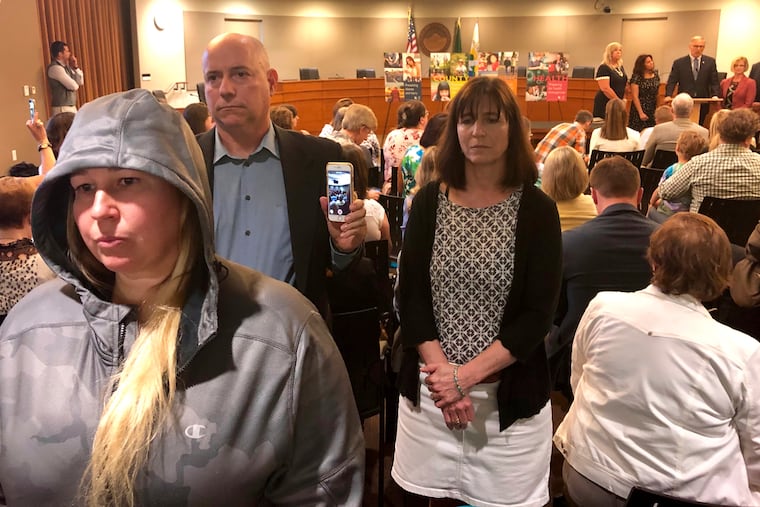Why a Philly pediatrician seeks common ground with vaccine-hesitant parents | Opinion
We are both acting out of a desperate instinct to protect children. We are both scared. We are just scared of different things.

I have never seen a case of measles in my 23 years as a practicing pediatrician. But I am reading up. Because I know it is only a matter of time.
The Centers for Disease Control and Prevention has confirmed 839 cases of measles in the United States since Jan. 1, 2019, the greatest number in any year since 1994. Five people so far have been infected in Pennsylvania. More cases are sure to come.
Measles can cause fever, runny nose, and a rash. And it can cause brain swelling, brain damage, and death. A two-dose vaccine series is 97 percent effective at preventing infection. But every day in pediatric practices across the nation, parents refuse to vaccinate their children.
I remember every child I have ever watched die. I remember the stillness of their bodies and the sobs of their mothers. These memories fuel a dread for each child that leaves my office without protection from vaccine-preventable illnesses. I used to believe that if only I were better at articulating this fear, at describing a child’s last breath, then parents would line right up. But I now understand we are not so different, vaccine-refusing parents and I. We are both acting out of a desperate instinct to protect children. We are both scared. We are just scared of different things.
Parents refuse vaccines for a range of reasons. One of my patient’s mothers says vaccines don’t work and will damage her child’s immune system. Another read that preservatives in the vials are toxic. Many parents express concerns about autism. A father wants his child to get the virus “naturally” so his immune system will be “stronger.” All of these parents love their children.
Frustration and anger are often my initial instincts, given the scientifically proven truths about vaccine efficacy and safety. But expressing outrage in the exam room only fuels resistance. No one listens to blue-in-the-face, percentage-spewing health-care providers. People listen to health-care providers who are open-hearted and who understand them as individuals.
This is why I find, and studies confirm, that the most productive way to discuss vaccines with hesitant parents is with empathy. Empathy for the love of a parent who deeply wants what is best for his or her child. Empathy for each parent’s concerns, whether or not they are grounded in fact.
It is empathy that guides the visit as I adhere to the following principles:
First, I make clear that I do not take vaccine refusal as a personal affront, or a rejection of my expertise. I set the stage for an open conversation rather than a battle.
Second, I turn away from the computer and I listen to parents’ worries, to all the things they have heard and read. As I listen, I acknowledge the crushing fear we all have of threats against our families, and the responsibility we feel to keep them safe.
Third, I share information. I articulate that my goal is not for parents to feel coerced, but for them to make decisions they are comfortable with, based on as many facts as possible. I explain the myriad ways we know with absolute certainty that vaccines do not cause autism, that the minute amount of preservatives cause no harm and that the immune system is more vulnerable, not less, without vaccines. I acknowledge that vaccines do carry true risks, such as fever and allergic reactions. And I avoid language such as “studies show” that identifies me as yet another member of a medical community that vaccine-hesitant families often do not trust.
Finally, I explain that I am a mother. I understand the pain of watching a needle pierce my baby’s unblemished skin. And yet I took all three of my children for their shots the moment they were eligible.
It is rare for a parent to say, “Great, let’s do it.” But it is common for a parent to say: “Thank you for your respect and understanding. I’ll think about what you said and I’ll be back.” This I consider a win. I have begun to build trust.
Experts debate whether pediatricians should even care for children whose parents refuse vaccines. The American Academy of Pediatrics originally guided us not to discharge vaccine-refusing patients from our practices but has recently revised its stance to say that doing so as a last resort is acceptable.
But to me it feels like a slippery slope. I cannot turn a child away. I cannot violate my oath to promote the health and well-being of every patient who walks in the door.
There are times my empathy lasts only through the first few visits. But if I can remain compassionate and patient long enough for one hesitant parent to feel more comfortable, I may protect one child from dying of measles. And that is something.
Dorothy R. Novick is a pediatrician in Philadelphia.